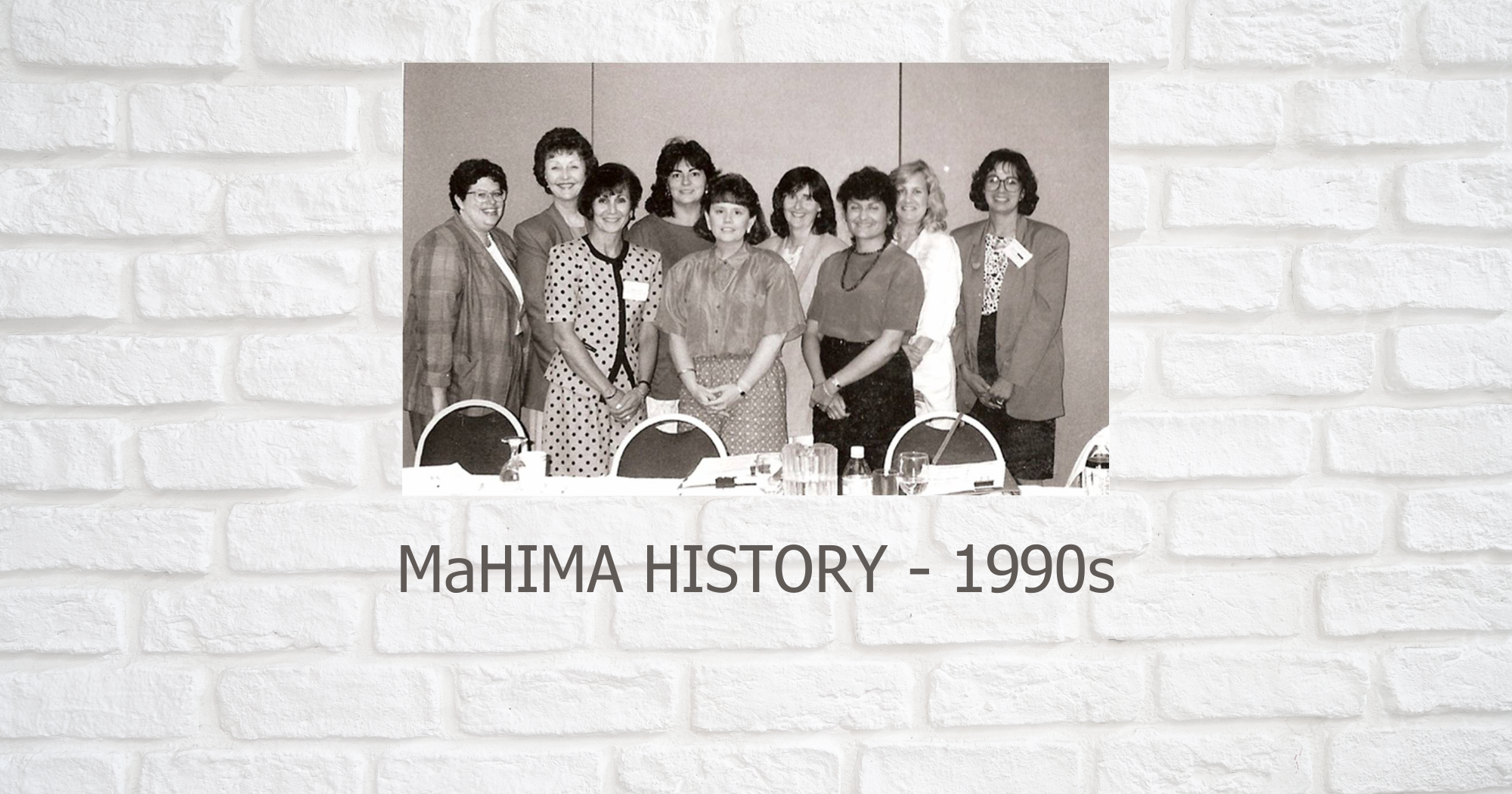
Past Presidents of the 1990’s
1999 – 2000 Constance Cavallaro, RHIT
1998 – 1999 Holly Ballam, RRA
1997 – 1998 Elizabeth DeSisto, RRA
1996 – 1997 Deborah Adair, RRA
1995 – 1996 Donna Volpe Casey, RRA
1994 – 1995 Louise Corcoran, ART
1993 – 1994 Dorothy Wagg, RRA
1992 – 1993 Judith Dancik, RRA
1991 – 1992 Cheryl Palo, RRA
1990 – 1991 Linda Hyde, RRA
1989 – 1990 Patricia Murphy, ART
“We have been bathed in change within our professional organization. Issues of credentialing, dues, representation, competency and the like roll over us like waves. Managing that change, whether through informational programs, white papers, advocacy, communication or technical assistance will continue to be the mandate of both MHIMA and AHIMA.” Dorothy Grandolfi Wagg, JD, RRA, President MHIMA 1993 – 1994, President’s Message, July 1993
Massachusetts entered the 1990’s looking to the future, participating in the national association’s Vision 2000. It would be during this decade that members were committed to the transformation of the profession from medical record practitioners to health information managers. In 1996 Vision 2000 became Vision 2006.
The 1991 AMRA House of Delegates voted to change the name of the national organization, AMRA, to AHIMA, American Health Information Management Association. In January 1992 the Board of Directors of MMRA approved the state’s name change to Massachusetts Health Information Management Association. This change was voted in by the membership at the winter meeting that year.
The buzz words for the 90’s were growth, recruiting, cost accounting, fiscal responsibility, copying costs, and, of course, DRGs. Eventually we added layoffs, closures, and mergers.
AHIMA started the State Health Information Advisor for Professional Recruitment program, SHAPER, which Massachusetts ran with to try and recruit individuals into the profession. MHIMA began a public relations campaign to bring attention to the association and also to recruit new members.
During the summer of 1993 many medical record departments became involved in a court case involving copying fees. A Boston law firm was challenging the fees charged by hospitals for copying medical records. This one case continued for a number of years and ultimately produced new laws regarding copying costs.
Confidentiality legislation was being introduced at the federal level. The Fair Health Information Privacy Act of 1994 was the beginning. Massachusetts already had laws that were stricter than those proposed nationally.
In 1997, in response to the legislative issue going on within the state and on a national level MHIMA hired a Legislative Consultant.
JCAHO standards changed during this decade. Information Management Plans were required and information management became the responsibility of everyone who generated, collected, analyzed or used health information.
The New England State Health Information Management Association came together for the first time in 1998 to hold a joint, two day Annual Meeting at Foxwoods Casino in Ledyard, Connecticut. The venture would mark the first of many successful annual meetings held in joint by the New England states.
In 1999, the AHIMA House of Delegates approved a credential name change. The Registered Record Administrator (RRA) became the Registered Health Information Administrator (RHIA) and the Accredited Record Technician (ART) became the Registered Health Information Technician (RHIT). New names to indicate the changes in the profession and to better fit the work that the members perform.
During this decade:
• MHIMA started the Coding Network in 1992 which provided coding education in various locations around the state.
• MHIMA held their first joint meeting with HFMA in 1991
• MHIMA and the Connecticut HIMA celebrate their 65th anniversary together at the AHIMA team talks in 1995.
• Laboure College added a Tumor Registry Program in 1995 and in 1996 Northeastern University began a Certificate Program in Cancer Data Management.
• In 1995 MHIMA member Linda Kloss, RHIA was hired to be AHIMA’s Executive Director.
• Attestation Statements were no longer required beginning in 1995.
